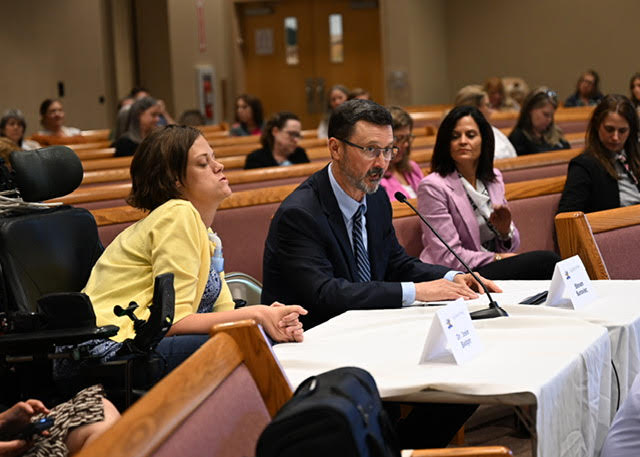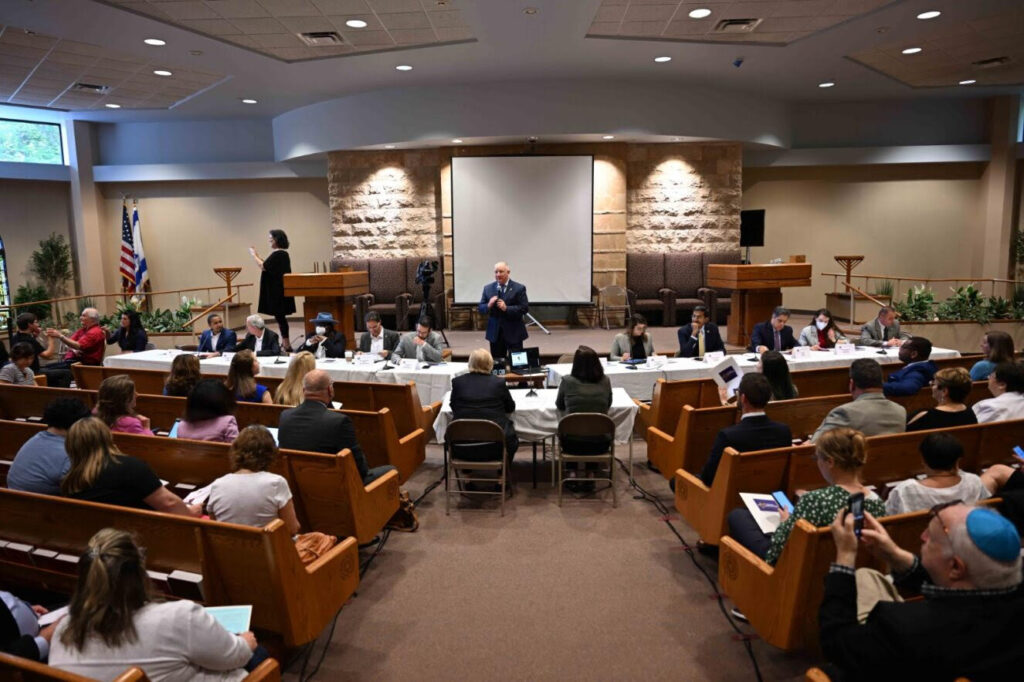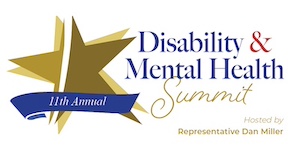
Summit Primers
Virtual Kickoff Event – Disability and Mental Health Reflections in Media
March 21, 2024 at 1 PM
Alyssa Myers, Representative Mike Schlossberg, and Jessica Tomko
Join us for a fun and easy conversation with self-advocates in the developmental, physical, and mental health communities as we look at the positive and negative of how people with a diagnosis are represented in television, film, theater, and other media. We will hear from three individuals with lived experience, who will share their thoughts about what works and what doesn’t work, keeping in mind that the goal is always to increase understanding and reduce stereotypes and stigma. This event will be available on RepDanMiller.com.
Virtual Kickoff Event – Advocates’ Perspective of State Budget for Disability and Mental Health
April 4, 2024 at 2 PM
Patrick Brier, Patrick DeMico, Paul Dlugolecki, and Dr. Richard Edley
Join us as we take a detailed look at the proposed 2024-2025 state budget with a specific focus on disability and mental health spending. This is a great event for those who want to dig deep, as we examine the various line items in these areas and look at what is being spent, how it’s being used, and what we can do to make it even better. This event will be available on RepDanMiller.com.
Continuing Education for Sessions on April 18-19
We have applied for sessions to be eligible for the following credit:
- Teachers (Act 48): all sessions approved for up to 11 credit hours – no charge for these credits!
- Social Workers, Licensed Marriage & Family Therapists, and Licensed Professional Counselors (CEU): all sessions approved for up to 11 credit hours – $15 for NASW members, $25 for non-members
- Lawyers (CLE): sessions marked CLE are approved for up to 7 credit hours – only $1.50 per credit hour
- Certified Rehabilitation Counselors (CE): all sessions approved for up to 10 credit hours – no charge for these credits!
Special Sessions
Summit Kickoff and Legislative Review
House Majority Whip Dan Miller
Join Representative Miller as he kicks off the 2024 Summit! He will provide a brief update on some of the key disability and mental health legislation and the budget currently being considered in Harrisburg, as well as highlighting some of the sessions and special events that will be taking place at the Summit this year.
Thursday Special Address – Governor Josh Shapiro
Friday Keynote Address – Allegheny County Disability and Mental Health
Allegheny County Executive Sara Innamorato
Breakout Sessions
Dating for People with a Diagnosis
Shawn McGill
Puberty and dating are daunting for anyone but can present even more challenges for those who are also managing neurodivergence and other core clinical issues. This training was developed to focus on critical areas to discuss and review as a support to anyone (young or old) who is beginning to consider jumping into the dating world. Areas include but are not limited to: the use of the Internet, critical areas specific to abuse prevention and safety, critical skills needed to successfully navigate the “unwritten social rules” related to building relationships and dating, and more!
Diagnosed as an Autistic Adult
Dr. Jessica Maher and Tessa Watkins
Diagnosing autism in adults brings with it a unique set of challenges, and many of those individuals who are seeking evaluation find these challenges difficult to navigate. This session will explore how an adult diagnosis is reached, the ramifications of such a diagnosis, and what this diagnosis can mean to the individual. In addition to the professional perspective, this session will feature a self-advocate who will describe her journey as an autistic adult.
Don’t Count Me Out! Reducing Early Childhood Suspension and Expulsion (CLE)
Ashley Harland, Jeff Ruder, Esq., Alicia Sebastian, and Valerie Williams
Commonly referred to as the “preschool to prison pipeline,” early childhood suspension and expulsion is a growing issue that can have lifelong effects on young children and families especially those with disabilities, developmental delays, and/or mental health needs. This session will be led by Trying Together with expert support from Ruder Law and will explore data, research, and stories related to early childhood suspension and expulsion. Participants will learn about the legal rights of families and young children with disabilities and/or mental health needs, support practices that can be utilized to build continuity across the school-home community continuum, and local resources to promote inclusive early learning experiences and kindergarten readiness.
An Early Reach into Transition
Mae Buckley, Lindsay Coulehan, Brett Glavey, and Andria McCourt
Led by Pittsburgh OVR’s Early Reach Coordinators, this session will educate the audience on the Pre-Employment Transition Services and Outreach opportunities provided by Early Reach. Year- long and seasonal programming will be discussed. The audience will get a chance to participate in examples of interactive activities offered to high school students with disabilities in Allegheny County.
Individual Advocacy and Systemic Change in Healthcare (CLE)
Matt Berwick and Monica Albert Still
Whether there are developmental, physical, mental, or intellectual needs, all disabled people need access to quality healthcare. From clinical appointments to dealing with insurance companies, disabled people need to be their own best advocate. This session will review how self-advocacy can lead to systems change, how healthcare systems can improve access to healthcare, and teach not only the strategies to utilize when accessing healthcare but how to empower your child to transition to self-advocacy.
The Loneliness Epidemic: Embracing the Power of Social Connection
Dr. Eric Golden
In 2023, the U.S. Surgeon General issued an Advisory entitled Our Epidemic of Loneliness and Isolation. Loneliness is defined as a state of discrepancy between an individual’s perceived and desired level of social connection. Half of all adults in the U.S. experience loneliness; senior citizens, individuals with disabilities, mental illness, and poor physical health are disproportionately affected. Social isolation increases risk of death from all causes, according to epidemiological research. To address the burden of social isolation, all members of society can play a role to strengthen social connection through raising awareness on the impact of loneliness, enacting policies to strengthen social infrastructure, and fostering a culture that promotes social connection.
Navigating Technology in Mental Health Treatment
Christine Michaels and Joel Richard
The use of technology has opened the door to a lot of new options for mental health treatment – telehealth, therapy apps, mindfulness apps, virtual support groups, social media, etc. During the pandemic, industry reports show that the use of digital behavioral health services became increasingly popular. This presentation will discuss the variety of services that are available and the pros and cons of using them, including privacy and insurance coverage.
“Normal Nerves,” Anxiety, or OCD?
Amanda Meredith and Ashley Montrenes
It can be difficult to determine whether the anxiety you are noticing in front of (or within you!) is
crossing into a clinical threshold. This session seeks to help you understand the various manifestations of anxiety and to provide an outline of the different evidence-based treatment models available to target anxiety. Additional local, international, and online resources will be provided to further assist you.
#NotAshamed: PRIDE in the Intersectionality of Mental Health and LGBTQ+
Joyce Bender and Scott Hammerstrom
Mental health impacts all communities, making understanding intersectionality of the unique
perspectives of all who live with mental health disabilities an imperative in connecting diverse
communities to effective mental fitness resources. The Bender Leadership Academy’s #NotAshamed campaign promotes understanding of the lived experience of members of the LGBTQ+ community who also live with mental health disabilities and explores how these two communities can utilize shared experiences from bullying to unemployment to promote empowerment, pride, and personal and professional success.
Protections for Individuals with Disabilities Under the Law (CLE)
Adrian Garcia, Meredith Millard, and Morgan Williams, Esq.
The Pennsylvania Human Relations Commission has been enforcing the Commonwealth’s anti-
discrimination laws since 1955. This session will explore the rights individuals with disabilities have to be free from discrimination in employment, education, public accommodations, and housing and commercial property. Learn what you can do to enforce your rights.
Supporting the Mental Health Needs of Veterans
State Senator Devlin Robinson
We count on veterans to keep our country safe, but all too often the deepest wounds from their service are the ones that are less obvious. Join us for a discussion led by veteran and state Senator Devlin Robinson and a panel of experts as we discuss how mental health services are provided in the service, how veterans are transitioned home in relation to mental health needs, how care is accessed, and what we can do to make sure that no veteran is left without the help they need.
The Provider Alliance Member Meeting
The Provider Alliance (TPA) is a dedicated community of inspired care, supporting agencies that support individuals and families with intellectual disabilities and autism (ID/A) across Pennsylvania. Join us for an informative session with our membership where we will cover the latest policy, budget, and service news affecting the ID/A community. This session will also serve as our annual Legislative Appreciation and ID/A Awareness Forum with our lawmakers and stakeholders from across the state and region.
Transportation: Issues, Advocacy and Resources (CLE)
Jeff Iseman and John Tague
The PA Transportation Alliance is an ad-hoc disability focused grassroots organizations which has been instrumental in the creation of Pennsylvania’s Persons With Disabilities (PwD) Shared Ride Program which started as a pilot in the 1990s, expanded to 65 Counties in Act 44 of 2007 and 66 Counties (Allegheny) added in Act 89 of 2013. The organization has also provided updates, public policy, and systems advocacy on other state and federal disability transportation issues such as accessible Transportation Networking Companies and Taxis, Medical Assistance Transportation, Amtrak, disability air travel, and accessible communities.
Waivers 101: An Overview of ODP IA/A Waivers
Brian Dengler and Michele O’Toole
This presentation will cover the basics about ODP’s Intellectual Disability and Autism (ID/A) Medicaid Waiver(s), including how the Office of Developmental Programs (ODP) partners with the County Administrative Entities (AE). The presentation will provide an overview of different types of waivers, including the Adult Autism waiver, the Consolidated waiver, the Person/Family Directed Support waiver, and the Community Living waiver. Learn who may be eligible, how eligibility is determined, what documentation is required and so much more.
Your Child’s First IEP (CLE)
Jeff Ruder, Esq.
The experience of the initial evaluation and development of a child’s first IEP can be stressful to any parent. With a myriad of new terms to learn, a great deal of paperwork to complete, and lots of signatures to provide, the process itself can seem confusing and often quite daunting. Join experts from Ruder Law as they walk you through what to expect. The session will take you through the initial steps of getting an evaluation, including the who’s, what’s, and how’s of the process, as well as how that evaluation leads to the development of the formal IEP. The goal of the session is to provide you with basic tools and understandings of how this process works, as well as to help you understand your rights under special education law.
Legislative Panels (CLE)
Access to Quality Assurance Checks for Complex Wheelchair Users
Matt Berwick, Vincent DeMarco, Jessica Gardner, Stephen Katich, and Dr. Mark Schmeler
This session will include a review of the challenges that complex wheelchair users have with traversing their daily personal and professional lives, and what can occur if their wheelchair needs to be repaired. You will learn about different types of wheelchairs, and how complex wheelchairs are fitted for the individual, as well as some of the checks and interventions that are needed for this type of equipment to keep it in good working order. We will review House Bill 183, Complex Wheelchair Quality Assurance, including how periodic wheelchair “well check” visits can help prevent catastrophic breakdowns for individuals using this equipment for their daily lives.
Mental Health and Foster Care: Unmet Needs and Untapped Opportunity
Mary Carroll, Laura Maines, Esq., and Kelley Swift, Esq.
There are almost 400,000 children and youth in foster care nationwide and mental health is the largest unmet health need for those in care. This panel will discuss the mental health needs of these vulnerable youth, the barriers to meeting those needs, and how a holistic, child-focused approach can make a difference.
Mental Health Staffing 101: Building for the Needs of Tomorrow
Gretchen Kelly, Dr. Michelle Schein and OMHSAS Deputy Secretary Jennifer Smith
This session is designed to help legislators and attendees better understand the professional staffing that makes up our mental health system and where staffing shortfalls are today and tomorrow. We will discuss regulatory challenges and recruitment issues, pay and reimbursement impediments, student debt and other issues that need to be addressed for our state to move forward proactively on mental health. We will be joined by Jennifer Smith, Deputy Secretary for the Office of Mental Health Substance Abuse Services under Governor Shapiro, an expert from our mental health providers, and an academic from our colleges to talk about how we can attract more students and produce more skilled professionals.
Disability and Mental Health Needs of Incarcerated People
Jason Beasom, Renee Madden, Melinda Murphy, Leigh Owens, Luciana Randall, and Alec Wright, Esq.
Thirty years after the Americans with Disabilities Act, conversations about mass incarceration in the United States rarely include mention of disability or mental health diagnoses. This population is more likely to end up in prison, and prisons can make disabilities and mental health challenges worse. This session will explore research and advocacy focused on the prevalence of mental illness, intellectual and developmental disabilities, autism, or cognitive impairment diagnoses in jails and prisons, what supports and programming exist, and what is still needed to ensure that the disability and mental health needs of those who are incarcerated are adequately met.


